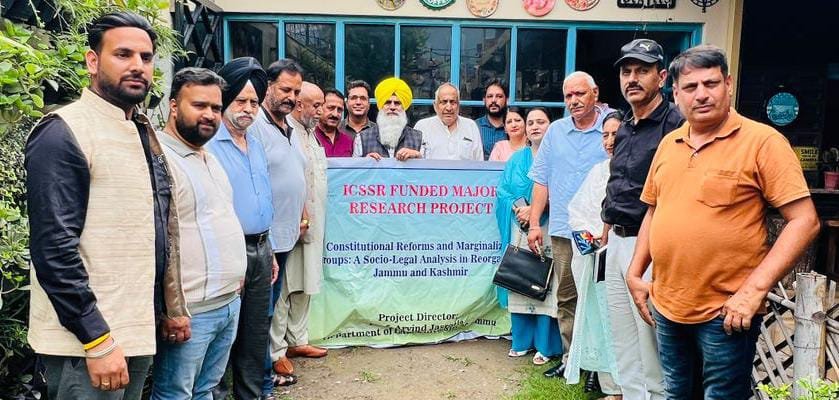POONCH : A critical Focus Group Discussion (FGD), part of an Indian Council of Social Science Research (ICSSR), New Delhi-sponsored study, brought together marginalized voices in Poonch to assess the fact that how constitutional reforms resonate with J&K most vulnerable communities.
Held at the Meeting Hall, Sifar Cafe, Poonch, the session centered on the project “Constitutional Reforms and Marginalized Groups: A Socio-Legal Analysis in Reorganized J&K” under the supervision of Professor Arvind Jasrotia (Project Director, Department of Law, University of Jammu). The research aims to assess the real-world socio-legal impact of constitutional reorganization on Scheduled Tribes (STs), Women, and Persons Displaced from Pakistan Occupied Jammu & Kashmir (POJK).
Dr. Kartika Bakshi, Research Assistant, set the stage, emphasizing the vital role of FGDs in uncovering the complex, intersecting challenges faced by these groups. Participants then engaged in a structured dialogue guided by a preset schedule, delving into critical areas including welfare measures & rehabilitation, education & reservations, Governance & Decision-Making, participation and representation in local governance, and community-specific concerns.
The discussion featured prominent civil society voices, including Adv. Mohd. Zaman; Jb. Taj Mir (Social Activist); Adv. Sunil Sharma (President, Bar Association Poonch); Ms. Neetu Sharma (Chairman, Insaniyat NGO); S. Surjan Singh; Sudarshan Sharma (Rtd. CEO); Mr. Lokesh Sharma (Social Activist); Adv. Tahir Aaftab (Secretary, Bar Association Poonch); Adv. Bhanu Partap; Ms. Nazia; Sahil Khajuria; Vikrant Sharma; Master Vinod Gupta; Rajinder Kumar ; Abdul Hamid Malik; Harmeet Kour; Adv. Saleem Sheikh; Adv. Navjot Sharma; Ajeet Sharma; Ajay Sharma, Dr. Nitan Sharma and Yogesh Sharma (Field Investigator).
Professor Arvind Jasrotia in his mesage emphasized: “This ground-level dialogue in Poonch is indispensable for our socio-legal analysis. Hearing directly from ST communities, women facing unique barriers, and POJK displaced families provides the empirical foundation needed to understand how constitutional frameworks translate – or falter – in securing their rights and welfare in the reorganized Union Territory.”




